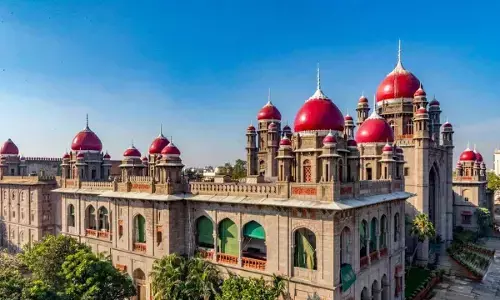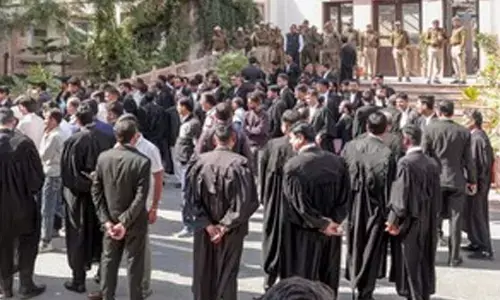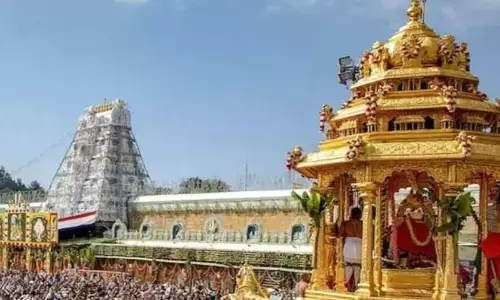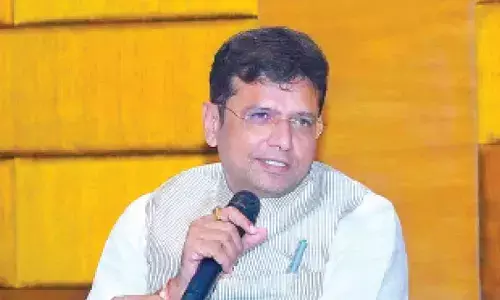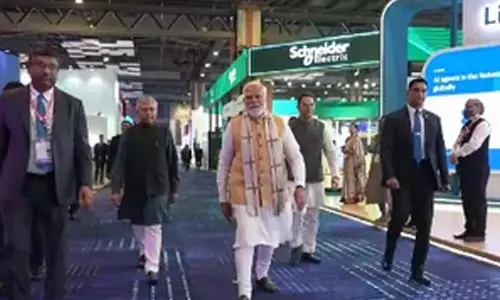Let intellectual bankruptcy not take toll on national interests

The open revolt by Jehadi groups actively supported by pseudo-secularist, anti -national lobby has now come out in open to challenge the sovereignty and integrity of India.
The open revolt by Jehadi groups actively supported by pseudo-secularist, anti -national lobby has now come out in open to challenge the sovereignty and integrity of India.
One can understand the involvement of Azadi and Tukde Tukde gangs as they are patently wedded to the terrorism and secessionist outfits, but one fails to understand the logic and intent behind the blind support to these anti- national elements by the self-proclaimed Constitutional experts and marginalised political leaders representing the so-called oppressed and neglected minorities and Dalits.
Otherwise, even a child understands the plain meaning of the term "Liberty" included in the preamble of our constitution. This liberty is the lawful freedom of expression, religion and preserving the traditions besides free movement throughout the country.
Obviously, such liberty or Azadi is not unfettered, but is subject to the reasonable restraints imposed by the State. Article 19 when read in its totality makes it very clear that the 'liberty' granted to a citizen is not and never available to the anti-national Jehadi, extremist and other divisive forces; rather the Constitution makes it an unavoidable duty of the government of the day to crush such forces ruthlessly without losing a single moment to retain the sovereignty, integrity and unity of our great country.
However, strangely these so-called Constitutional experts try to befool the gullible masses by saying that liberty means Azadi and according to them the Kashmiri separatists and Jehadi goons are perfectly right in shouting from the rooftop the simple and innocent looking word, Azadi.
These so-called intellectuals forget that by lending support to the divisive forces they are doing harm to the nation. No person with an average level of intelligence would agree to such an interpretation handed out by these experts with "coloured glasses" that liberty means Azadi which in fact, and in the present context means the freedom to indulge in anarchism.
Unfortunately, a few of the influential and occupants of powerful positions in the scheme of things of governance too have fallen prey to such vicious narrative.
Though one may be speaking as a matter of fact that 'dissent does not mean being anti-national' in the normal situation, but it carries a negative message at a time when the country is facing historic upheaval by the pogrom lashed out by criminal forces masquerading as political workers and public figures.
The much hyped anti-CAA-NRC 'peaceful' protests by the 'true' lovers of India, has now come out in full public view exposing its 'real' intent to destroy the secular, socialist democratic fabric of the country through violence and establish on our land, the Moghul Empire!
To say that the acts and provocative speeches by the fanatic elements should be pardoned since some other leaders too, have vented similar expressions would be unfair because the latter had simply reacted to the provocative and threatening speeches by the former.
Indeed, the present volatile situation and outbreak of violence in Delhi and other parts of the country cannot be termed as spontaneous. The seeds of these events were sown quiet a long ago in 1947 at the time of partition.
In 1976 during the period of infamous Emergency, by amending the preamble of the Constitution with insertion of the words "Secular and Socialist," the de facto dictator, Indira Gandhi, had only put a seal of approval on the evil designs of converting India into an Islamic State.
The present government has the necessary will and wherewithal to control fissiparous tendencies but what comes in the way to do so is probably the high ambition of the leadership to get recognition as the most liberal political leaders in the world.
Therefore, let the political leaders in command of the governance choose between their personal ambitions and interests of the truly nationalist forces within the country before it is too late. The message is quiet crystal clear: History does not pardon those who put their self before the national interests.
Last ditch attempt by a Nirbhaya convict
Even when death warrants against all the four condemned convicts are in force for their execution in the Nirbhaya case on March 3 at 6 am, in a last ditch attempt, one of the convicts Pawan Gupta has filed Curative petition in the Supreme Court on February 28, challenging the Order of Conviction and sentence in the 2012 Delhi gang rape and murder case which had rocked the country.
The petitioner has prayed for the commutation of death penalty to life sentence in his petition. Earlier a five-judge bench of the apex court dismissed the curative petitions of the other three convicts. Hope, though justice is delayed in this case, it would not be denied.
UK SC on refugee's rights
The UK Supreme Court in a recent judgment has allowed an appeal of a Rwandan national refugee who entered the United Kingdom because of his fear of persecution in his country. The appeal was for a claim for damages for false imprisonment.
The court observed that the appellant - refugee ever since his arrival in the UK was convicted in a number of offences and was also cautioned twice. The court was informed that the appellant had been convicted of a serious crime which constituted a danger to the community.
The appellant sought judicial review of the order of deportation which was dismissed. However, eventually it was found that the detention order itself was unlawful and the court directed the government to revoke the same and release him on bail. But by that time, the appellant had already spent 242 days in detention.
DELHI HC slams notices on top politicos
Acting upon the petition filed by an organisation called "Lawyers Voice" seeking court's direction to order an SIT probe into the inflammatory and provocative speeches made by certain political leaders, the Delhi High Court on February 28, issued notice to Delhi Police, Central Government and Delhi government.
The politicians are Sonia Gandhi, Rahul Gandhi, Priyanka Gandhi Vadra, Ammantullah Khan, Manish Sisodia, Waris Pathan, Akbaruddin Owaisi and Mehmood Paracha. The petition has sought action against these leaders who made hate speeches and instigated people to carry out violence. The court has fixed April 13 as the next date for hearing.
SC chastises striking lawyers
The Supreme Court has viewed the practice of holding strike and boycotting courts by advocates very seriously.
A bench comprising Justices Arun Mishra, S H Arya and M R Shah held that boycott of courts by advocates was illegal and cannot be justified as an exercise of right to freedom of speech and expression under article 19 (1)(a) of the Constitution of India and added, "Nobody has the right to go on strike / boycott courts.
Even, such a right, if any, cannot affect the rights of others and more particularly, the right of Speedy Justice guaranteed under Articles 14 and 21 of the Constitution." The Apex Court made these comments in course of hearing of an appeal filed by the District Bar Association, Dehradun against the government of the Uttarakhand and others.
Earlier also, on several occasions the courts have decried the practice of going on strike and boycotting the courts by advocates in the country.
Axe falls on 68 erring junior colleges
Acting upon a public interest litigation (PIL) filed by D. Rajesh, a social worker who alleged that managements of some private junior colleges, including those run by Sri Chaitanya and Narayana groups, were not following rules relating to affiliation and facilities.
Earlier, the Telangana High Court had instructed the government to take action against such colleges.
In an additional affidavit filed by the Board of Intermediate Education, the government assured the High Court that all colleges (numbering 68) without affiliation would be closed on completion of Intermediate annual examinations on March 28.
Good step indeed, but a million-dollar question remains unanswered: "How these 68 colleges could manage to run without mandatory affiliation from the BIE, all these years right under the nose of the government?"




